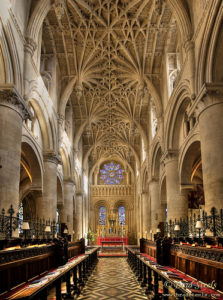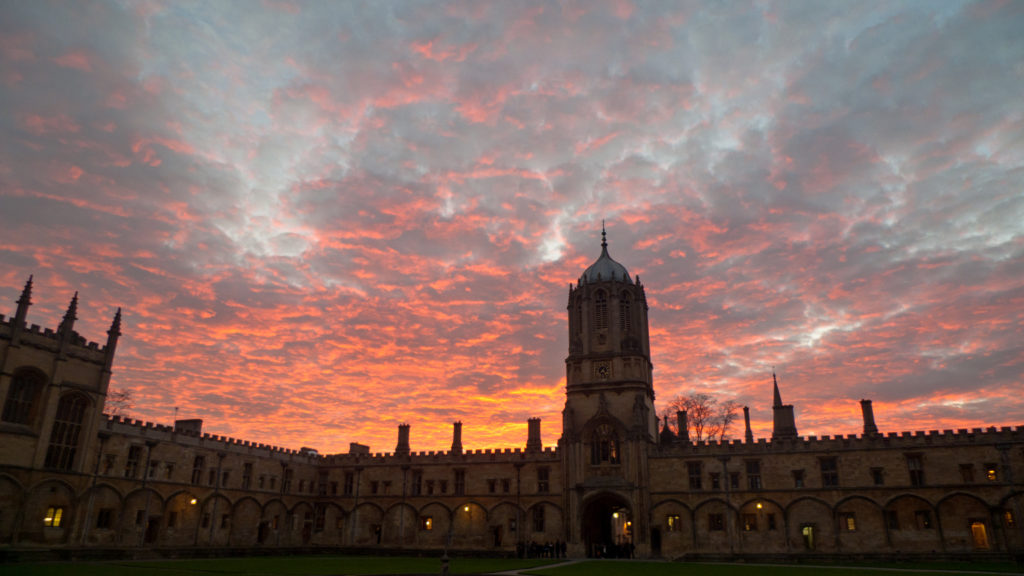
“Go into yourself. Find out the reason that commands you to write; see whether it has spread its roots into the very depths of your heart; confess to yourself whether you would have to die if you were forbidden to write….A work of art is good if it has arisen out of necessity. That is the only way one can judge it.”
Rainer Maria Rilke
“See it. Say it. Sorted.”
Golly. The train intercom was sure optimistic as it buoyantly encouraged the passengers to report any occurrence of suspicious activity. The road from London to Oxford had apparently been frequented by not only scholars but also criminals. Awesome. And yet the phrase continued to swirl in my head. A good use of alliteration, cadence, and economy of words. Yes, it seemed that England did in fact emulate the spirit of creative writing. But what was it, I contemplated, that composed creativity? Was it innate? Could it be learned? What if I didn’t have the goods?
“Next stop, Oxford.”
Well, it was time to move. I gathered my luggage, disembarking from one journey to embark upon another, asi es la vida, and this quest had one task: to unleash the creative. But what I ended up discovering, somewhat surprisingly, is that creativity seems to be quite undiscoverable. What is the reason? Well, to put it simply, creativity is not an easily articulated concept, that is, as far as concepts can even be articulated. And furthermore, it’s not a cliche. It is not a juice. It’s not a breath of stimulating air suspended outside the stifling realms of a mind box. It’s not an ethereal spark produced by some sort of haphazard ionization of ideas. It is neither an independent notion nor a notable conclusion.
No.
Creativity, in its most vulnerable state, is the abundance of generosity that spills your life into the lives of others.
Creativity is the “I must” that compels every duty-bound impulse. It is not an inward but an outward looking vantage point of the soul, sweeping over a meaningless expanse to find its target and woo it with endearments of truth: “You matter,” it whispers. “Arise. Be seen.”
Oxford, a town charming in both appearance and personality, has graciously preserved the sacredness of the creative impetus. Comfortably nestled between the Cherwell and Thames, it sleeps under the faithfulness of chiming bells that keep vigil with graceful promptitude and English propriety-those glorious, ancient spires staring eye to eye with the sky like watchmen.
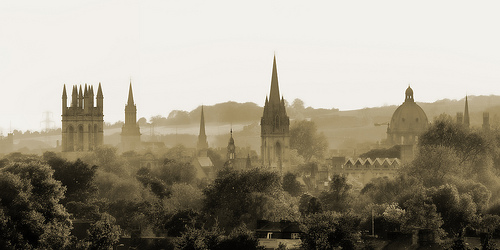
Oxford is a city of endless walking and yet there exists nothing so flippant as a meaningless stroll within its pensive boundaries. Each step seems to be propelled forward by a purposeful hope and is followed by the weighty summation of all past experiential reflection. Yes, it’s true that we are constantly bombarded with the awareness that we live in a world of differences, but at Oxford there is a resounding reminder that we are a diverse world in and unto ourselves. We are a secret waiting to be revealed. We are a vast cornucopia of matter, matters, and mattering. We are an abundance of bountiful meaning with straining sinews insinuating the certitude that our stories must escape. We must tell; we must explain. And we owe this first and foremost to ourselves.
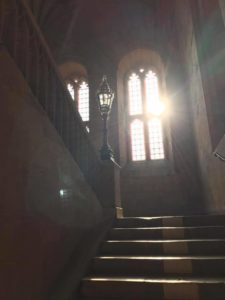
On the first day of class my tutor stated that this impulse, this desire to write, is by its very nature a generous act. She continued by characterizing this concept of “writer’s block” as an idea “full of danger” and delivered a thrilling narrative on this very subject of “narrative,” in which the key point boiled down to the simple truth that we are all full of stories and have every single thing we need in order to write. She then proceeded to give us a mantra (to have and to hold till doubt do us part), a very special phrase that would unconditionally carry us through every disquietude of that week and every week for the rest of our lives. The words were spoken softly at first, like the humble kindling of a flame, but as their gravity of meaning began to smolder, those epic syllables spread like wildfire through our hearts.
You are enough.
Bic pen. Drop.
Wow. I had been operating under the presumption that I would be taking a writing class-with a teacher and students, with questions and answers, with right and wrong methods-but as the hours unfolded and my heart expanded, I suddenly realized that this experience was so vastly superior to an arbitrary absorption of knowledge. This was far beyond the mere mechanics.
I would not be learning how to creatively write but rather how to right my creativity.
It’s true that I learned a great deal while sitting in that makeshift classroom (because, you know, Oxford has no regular classrooms), but the majority of what I gained was gifted to me from the atmosphere-from the town, from the customs, but most importantly from the people.
There was one particular night that is now seared in my memory as the most perfect of all fantasies. I spent a lovely evening on the lawn of the Magdalen sports field and watched the high school students perform a Midsummer Night’s Dream. Afterwards, I ambled with a
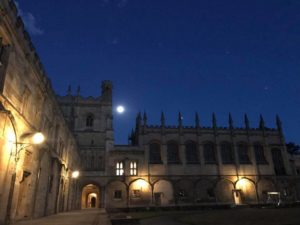 couple of friends back to Tom Quad. The air clothed us in a subtle current of coolness. Not wanting the night to end we reclined there on the stone, exchanging stories and fluffing the nighttime air with the exhale of our hopes, and dreams, and deepest desires. The full moon cast its silver light upon our faces and I had to smile at the irony-this was truly a midsummer night’s dream. There we were, mere neonates in this art of creativity, and yet that may have been the truest existence I ever had, the night I breathed in the life of another under the blushing stars and thought to myself, “Yes, we are the same.” My stony walls began to mirror the walls of Oxford that night, becoming noble instead of obtrusive, a haven instead of a prison, a beacon of strength instead of a shield for weakness.
couple of friends back to Tom Quad. The air clothed us in a subtle current of coolness. Not wanting the night to end we reclined there on the stone, exchanging stories and fluffing the nighttime air with the exhale of our hopes, and dreams, and deepest desires. The full moon cast its silver light upon our faces and I had to smile at the irony-this was truly a midsummer night’s dream. There we were, mere neonates in this art of creativity, and yet that may have been the truest existence I ever had, the night I breathed in the life of another under the blushing stars and thought to myself, “Yes, we are the same.” My stony walls began to mirror the walls of Oxford that night, becoming noble instead of obtrusive, a haven instead of a prison, a beacon of strength instead of a shield for weakness.
I learned on that night that creativity is not so much something you seek, but something you profess. It happens when the scales fall from your eyes and you see that you are at once everything and yet nothing. It is the rousing of conscience hitherto drowsied by the melancholy aloneness of being. It is the awakening to that hidden truth that these threads run together, that life has a pulse, that we are the masons of our own stony hearts. Creativity is when we stop building walls and start building cathedrals.
The secret is that you have all of the materials you need. You are enough. And your words have power.
See it. Say it. Sorted.
“A rock pile ceases to be a rock pile the moment a single man contemplates it, bearing within him the image of a cathedral.”
―Antoine de Saint-Exupery, The Little Prince
